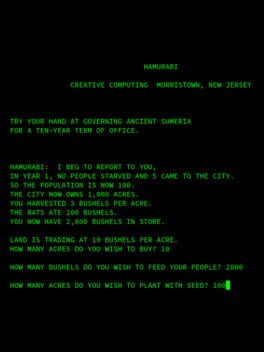I have this good friend whose taste in games seems to be constantly crawling backwards in time. From the PlayStation 1 to old arcade cabinets, to the Atari 2600, and now to this primitive little text delight. Of course, I'm grateful - I don't exactly stay on the bleeding edge of the gaming scene but at the same time my feet are pretty firmly planted in the contemporary indie game community, itch.io and all that and it's nice to get some perspective from the past especially when I've on some level been yearning to really give it a chance.
Hamurabi is a quaint little resource management game that despite its incredibly simple gameplay loop and primitive representation and programming manages to be an engaging bite-sized game the whole way through. In this game, you are Hamurabi, the ruler of some unknown land. Every year you are to divvy out the crops between being food for the people, being currency for acquiring and selling your land, and being planted for future harvests. The objective of the game is technically to have as much land as you can by the start of year 11, ignoring population and bushel count, but the consolidation of every single in-game transaction to heavily involve bushels in some way allows for every year of action to be a heavily considered and decisive move towards your goal. The short factor of the game helps this too, it's just long enough where you can really get the ball rolling but also short enough that if you are to catastrophically mess up it's no real skin off your back.
By year 5 of my first playthrough I had derived all of the non-random code that the game relies upon - it's all pretty simple math - but even when I had these things figured out and I had a calculator and notepad by my side jotting down random formulas and conversions, it was just as fun in this mode of play as it was kind of winging it. This takes the prize for the oldest game I've played, and manages to be surprisingly robust despite any apprehensions you might have about playing a game that was made before your parents were probably born.
Hamurabi is a quaint little resource management game that despite its incredibly simple gameplay loop and primitive representation and programming manages to be an engaging bite-sized game the whole way through. In this game, you are Hamurabi, the ruler of some unknown land. Every year you are to divvy out the crops between being food for the people, being currency for acquiring and selling your land, and being planted for future harvests. The objective of the game is technically to have as much land as you can by the start of year 11, ignoring population and bushel count, but the consolidation of every single in-game transaction to heavily involve bushels in some way allows for every year of action to be a heavily considered and decisive move towards your goal. The short factor of the game helps this too, it's just long enough where you can really get the ball rolling but also short enough that if you are to catastrophically mess up it's no real skin off your back.
By year 5 of my first playthrough I had derived all of the non-random code that the game relies upon - it's all pretty simple math - but even when I had these things figured out and I had a calculator and notepad by my side jotting down random formulas and conversions, it was just as fun in this mode of play as it was kind of winging it. This takes the prize for the oldest game I've played, and manages to be surprisingly robust despite any apprehensions you might have about playing a game that was made before your parents were probably born.
